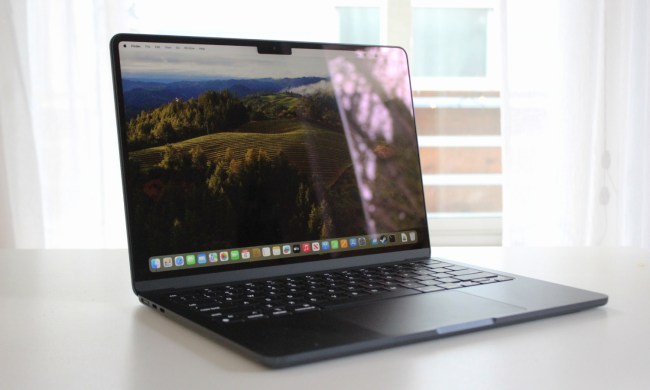
We wanted to see for ourselves if any browser stands out when it comes to squeezing the most life out of your notebook’s battery. We ran Chrome, Edge, Firefox, and Opera through three tests to see which offers the best browser battery life.
How we tested
We conducted our tests on two notebooks, the HP Spectre x360 15 and the HP EliteBook x360 G2.
The Spectre x360 15 test machine was a 15.6-inch convertible 2-in-1 with a 4K UHD (3,840 x 2,160) resolution display, equipped with a seventh-generation Core i7-7500U CPU, 16GB of RAM, and a 512GB PCIe SSD. The EliteBook x360 G2 test machine was a 13.3-inch convertible 2-in-1 with a Full HD (1,920 x 1,080) resolution display, equipped with a seventh-generation Core i7-7600U, 16GB of RAM, and a 512GB PCIe SSD.
These machines were both running the latest version of Windows 10 Creators Update edition, and brightness on both displays was set at 100 lux using a brightness calibration tool. Both machines were rebooted after each test and, as much as possible, background tasks were kept consistent throughout.
We wanted to see if any browser stands out when it comes to squeezing the most life out of your notebook.
The test environment was a home network with internet access serviced by a high-end Asus router, and extraneous network traffic during testing was minimized. Both machines were charged to 100 percent, the tests were run until the machines hibernated when the battery charge was exhausted. Care was taken during each test to ensure that no application or system errors interfered with test accuracy.
We tested Chrome 61, the latest version of Edge on Windows 10 Creators Update edition, Firefox 55, and Opera 48. No updates were performed on either the browsers or the machines while the tests were underway, and all browsers were at their default settings without any specific battery-saving features turned on.
Basemark results
Our first test used the battery test configuration of the Basemark browser benchmark. Basemark runs through a series of performance tests measuring a browser’s ability to use today’s complex web-based applications. The Basemark battery test configuration loops the performance benchmark and periodically pings the server to note the elapsed time, with a URL to check for total elapsed time.
On the Spectre x360 15, only 18 minutes separated the top-performing browser, Edge, from the worst-performing browser, Chrome. On the EliteBook x360 13, 25 minutes separated Opera 48, the best performer, from Chrome, again the worst performer.
Given that Basemark is a performance test and so focuses on speed rather than efficiency, we didn’t expect to see much difference in battery life between browsers. These results generally met our expectation, with no browser significantly performing better than the others. Still, Chrome consistently came last in this test, and that may matter if you find yourself trying to use the web on a laptop with a sliver of battery charge left over.
Netflix video streaming results
We used the default Netflix player in each browser to run through the first season of “Lost,” a title that is not available in 4K, and so wouldn’t affect Edge’s performance on the Spectre x360 (Edge can play 4K Netflix video on machines with seventh-generation Intel Core processors). We manually forwarded to the next video at the end of every other episode, to ensure that Netflix did not pause waiting for user input. We used the PassMark BatteryMon app to create a log file with 60-second updates, to indicate when the machine hibernated.
Our results in the Netflix test were consistent across both the Spectre x360 15 and the EliteBook x360 G2. Opera 48 and Edge were the two best performers, coming in within a few minutes of each other. Chrome came in second, and Firefox came in a distant third.
The most significant difference that we saw in our testing was between Edge and Firefox on the Spectre x360 15, where Edge lasted a full 100 minutes longer. On the EliteBook x360 G2, the greatest difference was between Opera and Firefox, with Opera lasting 80 minutes long on this machine.
These results are good news for Edge and Opera. Those browsers performed far better in this test than their competitors, and the difference is large enough that you’d notice it. Choosing Edge or Opera, instead of Firefox, would get you through an entire extra episode of your favorite show.
Web browsing script results
For this test, we used the Jitbit Macro Recorder tool to create a script that opened each browser to a specific web page, let the page load and run for a variable amount of time, closed the browser window with a delay to ensure that the browser was fully shut down, and then opened the browser to the next test page. We used many popular web pages for the test, and let the script repeat until the battery ran out. As with the Netflix test, we used the Batterymon app to note when the machine hibernated.
On the Spectre x360 15, Edge stood out as the top performer, lasting for 54 minutes longer than the worst performer, Firefox. Chrome and Opera were within a few minutes of each other. On the EliteBook x360 G2, however, Opera was the standout, lasting for 40 minutes longer than Firefox, with Edge coming in at only five minutes less than Opera.
Firefox was again the only consistently poor performer in this test, while Edge and Opera were again the best performers. However, most browsers came relatively close to each other. Firefox was again the biggest loser coming in 30 to 50 minutes behind the leaders.
The differences are real, though often not dramatic
Given the noise being made by browser developers over battery life advantages, we expected to see a more striking difference between the best and worst browsers. Our testing was admittedly non-scientific, but it was real-world enough that we expected to see significant differences if they existed. Our results weren’t dramatic. In general, most browsers were close to each other, and we’re not sure the differences would be noticeable outside of benchmarks.
Yet we do think there’s a winner – Edge. It won three of the six tests, and came in a very close second in two of the three tests it didn’t win. It also never came in last. Opera also won three of six tests, but it is noticeably behind Edge in two tests, while blowing out Microsoft’s browser just once. That, we think, puts it in second place.
Chrome did not perform poorly, but it didn’t do well, either. It didn’t win any of our tests, and it came in last twice. Our tests suggest you’re not giving up too much endurance by using Chrome, but also show that you can expect Google’s browser to kill your charge faster than most competitors.
Which brings us to Firefox. Our tests suggest Mozilla decided not to throw stones because it lives in a glass house. Its browser was last in four of six tests, and only came close to winning once. The Netflix tests were particularly significant. If you plan to marathon your favorite show, pick another browser.
These results put an interesting perspective on debates about the best web browsers. Chrome often gets the nod, and Firefox is also a fan favorite. We like to use both browsers at Digital Trends, and recommend Chrome as a first choice. If you need to squeeze every last minute of battery from your laptop, though, you should consider the alternatives.


